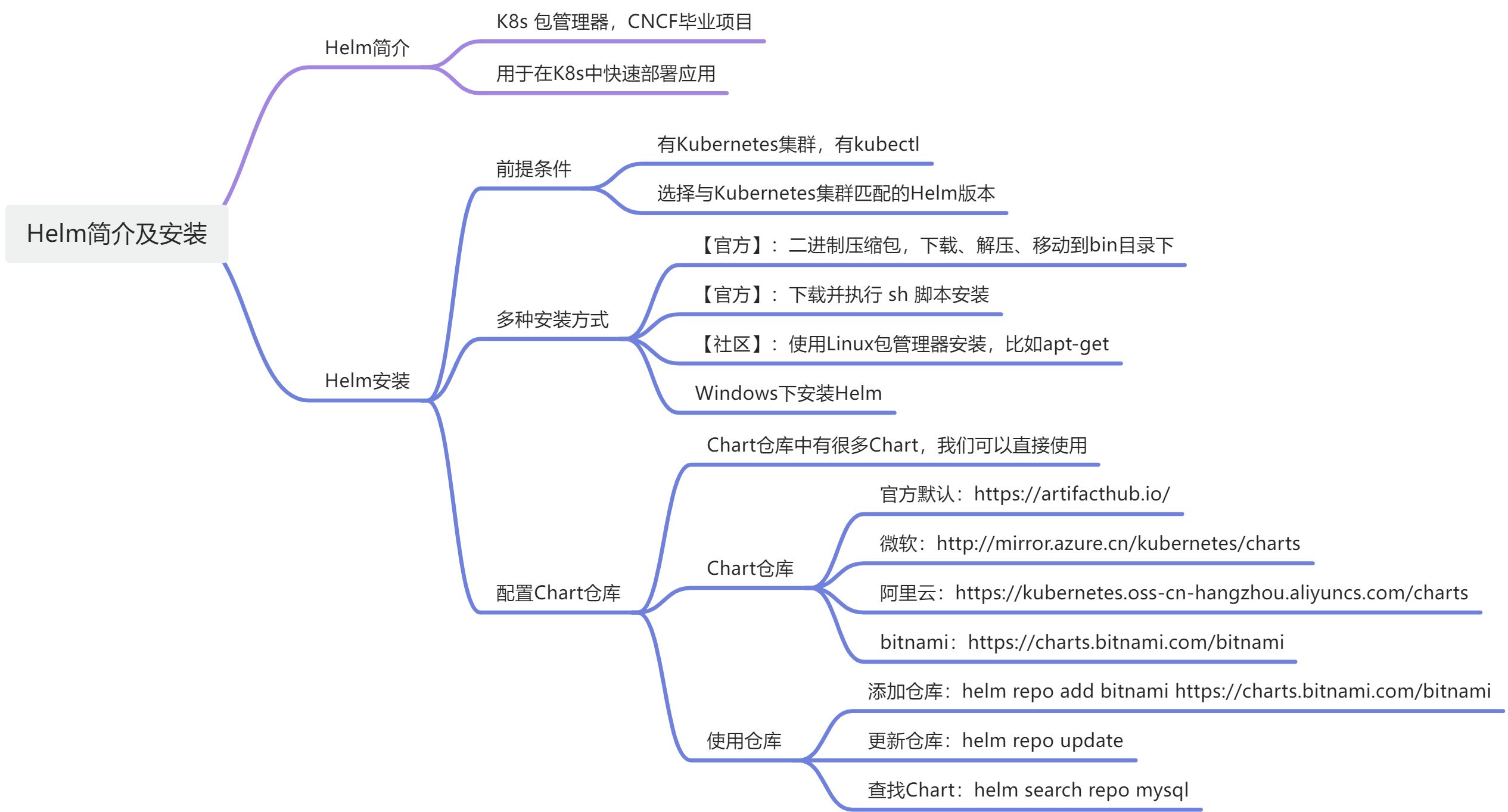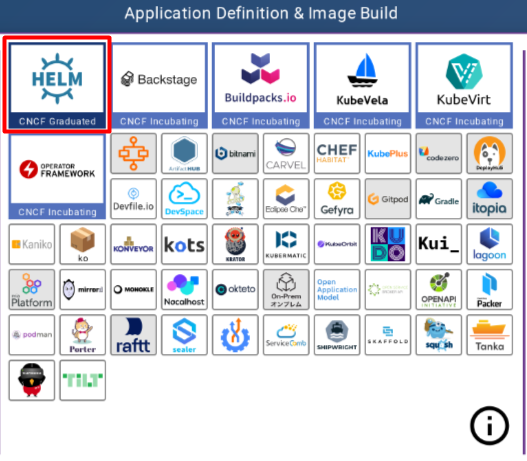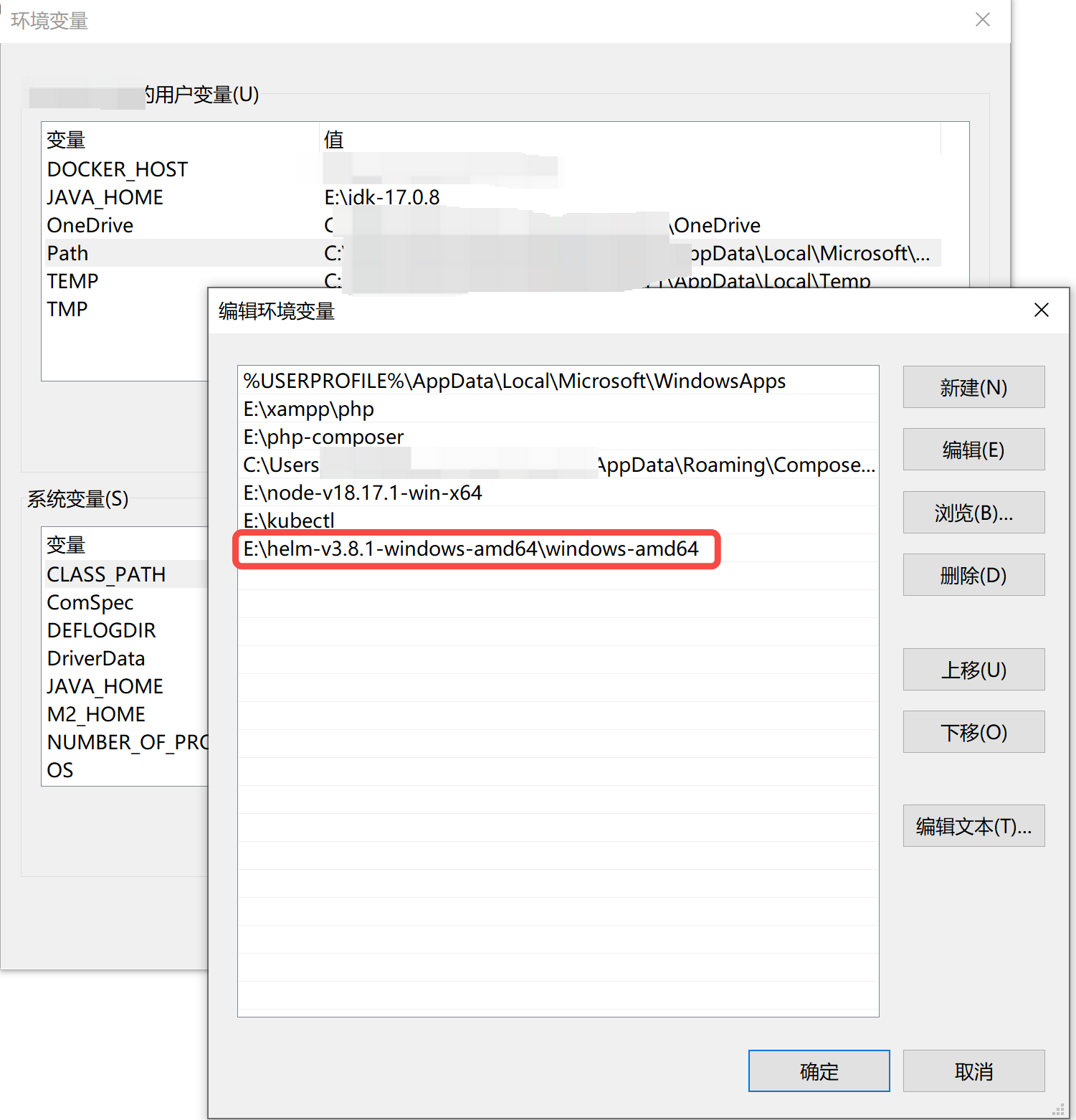🚀 本文内容
- 什么是 Helm?K8s 包管理器,便于在 K8s 下快速部署应用。
- 介绍 Helm 的几种安装方式
⭐ 思维导图

Helm 简介
💚 什么是 Helm?The package manager for Kubernetes. K8s 包管理器,已经在 CNCF 毕业的哦。
💨 什么是包管理器?就类似于 Node 里面的 npm,Linux 下的 yum 一样,都是为了快速安装。
在 Node 中,使用 npm 可以快速安装依赖包。比如 npm install vue。
在 Linux 中,使用 yum 可以快速安装软件包。比如 yum install telnet。

✔️ 官网:https://helm.sh/

Helm 安装
想要使用 Helm 在 K8s 中部署,那么得先安装 Helm。
前提条件
首先,我们需要有一个 K8s 集群,也得有对应的 kubectl。
其次,我们需要选择合适的 Helm 版本,不同的 Helm 版本支持不同的 Kubernetes 版本。
- 查看 Kubernetes 版本及 kubectl 版本
kubectl version
# Client Version: version.Info{Major:"1", Minor:"18", GitVersion:"v1.18.20", GitCommit:"1f3e19b7beb1cc0110255668c4238ed63dadb7ad", GitTreeState:"clean", BuildDate:"2021-06-16T12:58:51Z", GoVersion:"go1.13.15", Compiler:"gc", Platform:"linux/amd64"}
# Server Version: version.Info{Major:"1", Minor:"18", GitVersion:"v1.18.0", GitCommit:"9e991415386e4cf155a24b1da15becaa390438d8", GitTreeState:"clean", BuildDate:"2020-03-25T14:50:46Z", GoVersion:"go1.13.8", Compiler:"gc", Platform:"linux/amd64"}
- Helm 版本与支持的 Kubernetes 版本对应关系:https://helm.sh/zh/docs/topics/version_skew/
| Helm 版本 | 支持的 Kubernetes 版本 |
|---|---|
| 3.12.x | 1.27.x - 1.24.x |
| 3.11.x | 1.26.x - 1.23.x |
| 3.10.x | 1.25.x - 1.22.x |
| 3.9.x | 1.24.x - 1.21.x |
| 3.8.x | 1.23.x - 1.20.x |
| 3.7.x | 1.22.x - 1.19.x |
| 3.6.x | 1.21.x - 1.18.x |
| 3.5.x | 1.20.x - 1.17.x |
| 3.4.x | 1.19.x - 1.16.x |
| 3.3.x | 1.18.x - 1.15.x |
所以,这里我们选择选择 3.3.x ~ 3.6.x 的 Helm 版本。
多种安装方式
helm 安装方式有三种:
- 【官方】二进制压缩包安装:下载 tar.gz 压缩包,然后移动到 bin 目录
- 【官方】下载 sh 脚本安装
- 【社区,非官方维护】使用包管理器安装(比如 Ubuntu 使用 apt-get 等)
方法 1:二进制压缩包安装
下载地址:https://github.com/helm/helm/releases
# 下载
wget https://get.helm.sh/helm-v3.3.4-linux-amd64.tar.gz
# 解压
tar -zxvf helm-v3.3.4-linux-amd64.tar.gz
# 移动到可执行目录
mv linux-amd64/helm /usr/local/bin/helm
# 查看 helm 版本(确保可正常运行)
helm version
# version.BuildInfo{Version:"v3.6.3", GitCommit:"d506314abfb5d21419df8c7e7e68012379db2354", GitTreeState:"clean", GoVersion:"go1.16.5"}
方法 2:sh 脚本安装
helm 提供了 shell 脚本,可以快速安装。
# 下载脚本
curl -fsSL -o get_helm.sh https://raw.githubusercontent.com/helm/helm/main/scripts/get-helm-3
# 添加权限
chmod 700 get_helm.sh
# 查看用法
./get_helm.sh --help
# Accepted cli arguments are:
# [--help|-h ] ->> prints this help
# [--version|-v <desired_version>] . When not defined it fetches the latest release from GitHub
# e.g. --version v3.0.0 or -v canary
# [--no-sudo] ->> install without sudo
# 安装最新版本
./get_helm.sh
# 安装指定版本
./get_helm.sh --version v3.3.4
get-helm-3 脚本原理:和二进制压缩包安装相似
- 可配置项
- Helm 安装目录:HELM_INSTALL_DIR 环境变量指定,默认 /usr/local/bin
- 二进制名称:BINARY_NAME 环境变量指定,默认 helm
- 是否使用 sudo:USE_SUDO 环境变量指定,默认 true
- 是否 debug 模式:DEBUG 环境变量指定,默认 false
- 是否验证校验和:VERIFY_CHECKSUM 环境变量指定,默认 true
- 是否校验签名:VERIFY_SIGNATURES 环境变量指定,默认 false
- 安装流程:下面是上述脚本中的代码流程
# 初始化系统架构,比如 amd64、arm64
initArch
# 初始化操作系统,比如 Linux、Windows
initOS
# 验证 OS 和架构组合后,能不能找到对应的二进制压缩包
verifySupported
# 检查预期的版本是否存在
checkDesiredVersion
# 检查是否已经安装,如果已安装则打印已安装版本
if ! checkHelmInstalledVersion; then
# 下载文件
downloadFile
# 校验文件,SHA256 校验和、GPG 签名
verifyFile
# 安装二进制文件
installFile
fi
# 测试是否可用
testVersion
# 清理,删除临时文件
cleanup
get-helm-3 脚本如下:
#!/usr/bin/env bash
# Copyright The Helm Authors.
#
# Licensed under the Apache License, Version 2.0 (the "License");
# you may not use this file except in compliance with the License.
# You may obtain a copy of the License at
#
# http://www.apache.org/licenses/LICENSE-2.0
#
# Unless required by applicable law or agreed to in writing, software
# distributed under the License is distributed on an "AS IS" BASIS,
# WITHOUT WARRANTIES OR CONDITIONS OF ANY KIND, either express or implied.
# See the License for the specific language governing permissions and
# limitations under the License.
# The install script is based off of the MIT-licensed script from glide,
# the package manager for Go: https://github.com/Masterminds/glide.sh/blob/master/get
: ${BINARY_NAME:="helm"}
: ${USE_SUDO:="true"}
: ${DEBUG:="false"}
: ${VERIFY_CHECKSUM:="true"}
: ${VERIFY_SIGNATURES:="false"}
: ${HELM_INSTALL_DIR:="/usr/local/bin"}
: ${GPG_PUBRING:="pubring.kbx"}
HAS_CURL="$(type "curl" &> /dev/null && echo true || echo false)"
HAS_WGET="$(type "wget" &> /dev/null && echo true || echo false)"
HAS_OPENSSL="$(type "openssl" &> /dev/null && echo true || echo false)"
HAS_GPG="$(type "gpg" &> /dev/null && echo true || echo false)"
HAS_GIT="$(type "git" &> /dev/null && echo true || echo false)"
# initArch discovers the architecture for this system.
initArch() {
ARCH=$(uname -m)
case $ARCH in
armv5*) ARCH="armv5";;
armv6*) ARCH="armv6";;
armv7*) ARCH="arm";;
aarch64) ARCH="arm64";;
x86) ARCH="386";;
x86_64) ARCH="amd64";;
i686) ARCH="386";;
i386) ARCH="386";;
esac
}
# initOS discovers the operating system for this system.
initOS() {
OS=$(echo `uname`|tr '[:upper:]' '[:lower:]')
case "$OS" in
# Minimalist GNU for Windows
mingw*|cygwin*) OS='windows';;
esac
}
# runs the given command as root (detects if we are root already)
runAsRoot() {
if [ $EUID -ne 0 -a "$USE_SUDO" = "true" ]; then
sudo "${@}"
else
"${@}"
fi
}
# verifySupported checks that the os/arch combination is supported for
# binary builds, as well whether or not necessary tools are present.
verifySupported() {
local supported="darwin-amd64\ndarwin-arm64\nlinux-386\nlinux-amd64\nlinux-arm\nlinux-arm64\nlinux-ppc64le\nlinux-s390x\nlinux-riscv64\nwindows-amd64"
if ! echo "${supported}" | grep -q "${OS}-${ARCH}"; then
echo "No prebuilt binary for ${OS}-${ARCH}."
echo "To build from source, go to https://github.com/helm/helm"
exit 1
fi
if [ "${HAS_CURL}" != "true" ] && [ "${HAS_WGET}" != "true" ]; then
echo "Either curl or wget is required"
exit 1
fi
if [ "${VERIFY_CHECKSUM}" == "true" ] && [ "${HAS_OPENSSL}" != "true" ]; then
echo "In order to verify checksum, openssl must first be installed."
echo "Please install openssl or set VERIFY_CHECKSUM=false in your environment."
exit 1
fi
if [ "${VERIFY_SIGNATURES}" == "true" ]; then
if [ "${HAS_GPG}" != "true" ]; then
echo "In order to verify signatures, gpg must first be installed."
echo "Please install gpg or set VERIFY_SIGNATURES=false in your environment."
exit 1
fi
if [ "${OS}" != "linux" ]; then
echo "Signature verification is currently only supported on Linux."
echo "Please set VERIFY_SIGNATURES=false or verify the signatures manually."
exit 1
fi
fi
if [ "${HAS_GIT}" != "true" ]; then
echo "[WARNING] Could not find git. It is required for plugin installation."
fi
}
# checkDesiredVersion checks if the desired version is available.
checkDesiredVersion() {
if [ "x$DESIRED_VERSION" == "x" ]; then
# Get tag from release URL
local latest_release_url="https://get.helm.sh/helm-latest-version"
local latest_release_response=""
if [ "${HAS_CURL}" == "true" ]; then
latest_release_response=$( curl -L --silent --show-error --fail "$latest_release_url" 2>&1 || true )
elif [ "${HAS_WGET}" == "true" ]; then
latest_release_response=$( wget "$latest_release_url" -q -O - 2>&1 || true )
fi
TAG=$( echo "$latest_release_response" | grep '^v[0-9]' )
if [ "x$TAG" == "x" ]; then
printf "Could not retrieve the latest release tag information from %s: %s\n" "${latest_release_url}" "${latest_release_response}"
exit 1
fi
else
TAG=$DESIRED_VERSION
fi
}
# checkHelmInstalledVersion checks which version of helm is installed and
# if it needs to be changed.
checkHelmInstalledVersion() {
if [[ -f "${HELM_INSTALL_DIR}/${BINARY_NAME}" ]]; then
local version=$("${HELM_INSTALL_DIR}/${BINARY_NAME}" version --template="{{ .Version }}")
if [[ "$version" == "$TAG" ]]; then
echo "Helm ${version} is already ${DESIRED_VERSION:-latest}"
return 0
else
echo "Helm ${TAG} is available. Changing from version ${version}."
return 1
fi
else
return 1
fi
}
# downloadFile downloads the latest binary package and also the checksum
# for that binary.
downloadFile() {
HELM_DIST="helm-$TAG-$OS-$ARCH.tar.gz"
DOWNLOAD_URL="https://get.helm.sh/$HELM_DIST"
CHECKSUM_URL="$DOWNLOAD_URL.sha256"
HELM_TMP_ROOT="$(mktemp -dt helm-installer-XXXXXX)"
HELM_TMP_FILE="$HELM_TMP_ROOT/$HELM_DIST"
HELM_SUM_FILE="$HELM_TMP_ROOT/$HELM_DIST.sha256"
echo "Downloading $DOWNLOAD_URL"
if [ "${HAS_CURL}" == "true" ]; then
curl -SsL "$CHECKSUM_URL" -o "$HELM_SUM_FILE"
curl -SsL "$DOWNLOAD_URL" -o "$HELM_TMP_FILE"
elif [ "${HAS_WGET}" == "true" ]; then
wget -q -O "$HELM_SUM_FILE" "$CHECKSUM_URL"
wget -q -O "$HELM_TMP_FILE" "$DOWNLOAD_URL"
fi
}
# verifyFile verifies the SHA256 checksum of the binary package
# and the GPG signatures for both the package and checksum file
# (depending on settings in environment).
verifyFile() {
if [ "${VERIFY_CHECKSUM}" == "true" ]; then
verifyChecksum
fi
if [ "${VERIFY_SIGNATURES}" == "true" ]; then
verifySignatures
fi
}
# installFile installs the Helm binary.
installFile() {
HELM_TMP="$HELM_TMP_ROOT/$BINARY_NAME"
mkdir -p "$HELM_TMP"
tar xf "$HELM_TMP_FILE" -C "$HELM_TMP"
HELM_TMP_BIN="$HELM_TMP/$OS-$ARCH/helm"
echo "Preparing to install $BINARY_NAME into ${HELM_INSTALL_DIR}"
runAsRoot cp "$HELM_TMP_BIN" "$HELM_INSTALL_DIR/$BINARY_NAME"
echo "$BINARY_NAME installed into $HELM_INSTALL_DIR/$BINARY_NAME"
}
# verifyChecksum verifies the SHA256 checksum of the binary package.
verifyChecksum() {
printf "Verifying checksum... "
local sum=$(openssl sha1 -sha256 ${HELM_TMP_FILE} | awk '{print $2}')
local expected_sum=$(cat ${HELM_SUM_FILE})
if [ "$sum" != "$expected_sum" ]; then
echo "SHA sum of ${HELM_TMP_FILE} does not match. Aborting."
exit 1
fi
echo "Done."
}
# verifySignatures obtains the latest KEYS file from GitHub main branch
# as well as the signature .asc files from the specific GitHub release,
# then verifies that the release artifacts were signed by a maintainer's key.
verifySignatures() {
printf "Verifying signatures... "
local keys_filename="KEYS"
local github_keys_url="https://raw.githubusercontent.com/helm/helm/main/${keys_filename}"
if [ "${HAS_CURL}" == "true" ]; then
curl -SsL "${github_keys_url}" -o "${HELM_TMP_ROOT}/${keys_filename}"
elif [ "${HAS_WGET}" == "true" ]; then
wget -q -O "${HELM_TMP_ROOT}/${keys_filename}" "${github_keys_url}"
fi
local gpg_keyring="${HELM_TMP_ROOT}/keyring.gpg"
local gpg_homedir="${HELM_TMP_ROOT}/gnupg"
mkdir -p -m 0700 "${gpg_homedir}"
local gpg_stderr_device="/dev/null"
if [ "${DEBUG}" == "true" ]; then
gpg_stderr_device="/dev/stderr"
fi
gpg --batch --quiet --homedir="${gpg_homedir}" --import "${HELM_TMP_ROOT}/${keys_filename}" 2> "${gpg_stderr_device}"
gpg --batch --no-default-keyring --keyring "${gpg_homedir}/${GPG_PUBRING}" --export > "${gpg_keyring}"
local github_release_url="https://github.com/helm/helm/releases/download/${TAG}"
if [ "${HAS_CURL}" == "true" ]; then
curl -SsL "${github_release_url}/helm-${TAG}-${OS}-${ARCH}.tar.gz.sha256.asc" -o "${HELM_TMP_ROOT}/helm-${TAG}-${OS}-${ARCH}.tar.gz.sha256.asc"
curl -SsL "${github_release_url}/helm-${TAG}-${OS}-${ARCH}.tar.gz.asc" -o "${HELM_TMP_ROOT}/helm-${TAG}-${OS}-${ARCH}.tar.gz.asc"
elif [ "${HAS_WGET}" == "true" ]; then
wget -q -O "${HELM_TMP_ROOT}/helm-${TAG}-${OS}-${ARCH}.tar.gz.sha256.asc" "${github_release_url}/helm-${TAG}-${OS}-${ARCH}.tar.gz.sha256.asc"
wget -q -O "${HELM_TMP_ROOT}/helm-${TAG}-${OS}-${ARCH}.tar.gz.asc" "${github_release_url}/helm-${TAG}-${OS}-${ARCH}.tar.gz.asc"
fi
local error_text="If you think this might be a potential security issue,"
error_text="${error_text}\nplease see here: https://github.com/helm/community/blob/master/SECURITY.md"
local num_goodlines_sha=$(gpg --verify --keyring="${gpg_keyring}" --status-fd=1 "${HELM_TMP_ROOT}/helm-${TAG}-${OS}-${ARCH}.tar.gz.sha256.asc" 2> "${gpg_stderr_device}" | grep -c -E '^\[GNUPG:\] (GOODSIG|VALIDSIG)')
if [[ ${num_goodlines_sha} -lt 2 ]]; then
echo "Unable to verify the signature of helm-${TAG}-${OS}-${ARCH}.tar.gz.sha256!"
echo -e "${error_text}"
exit 1
fi
local num_goodlines_tar=$(gpg --verify --keyring="${gpg_keyring}" --status-fd=1 "${HELM_TMP_ROOT}/helm-${TAG}-${OS}-${ARCH}.tar.gz.asc" 2> "${gpg_stderr_device}" | grep -c -E '^\[GNUPG:\] (GOODSIG|VALIDSIG)')
if [[ ${num_goodlines_tar} -lt 2 ]]; then
echo "Unable to verify the signature of helm-${TAG}-${OS}-${ARCH}.tar.gz!"
echo -e "${error_text}"
exit 1
fi
echo "Done."
}
# fail_trap is executed if an error occurs.
fail_trap() {
result=$?
if [ "$result" != "0" ]; then
if [[ -n "$INPUT_ARGUMENTS" ]]; then
echo "Failed to install $BINARY_NAME with the arguments provided: $INPUT_ARGUMENTS"
help
else
echo "Failed to install $BINARY_NAME"
fi
echo -e "\tFor support, go to https://github.com/helm/helm."
fi
cleanup
exit $result
}
# testVersion tests the installed client to make sure it is working.
testVersion() {
set +e
HELM="$(command -v $BINARY_NAME)"
if [ "$?" = "1" ]; then
echo "$BINARY_NAME not found. Is $HELM_INSTALL_DIR on your "'$PATH?'
exit 1
fi
set -e
}
# help provides possible cli installation arguments
help () {
echo "Accepted cli arguments are:"
echo -e "\t[--help|-h ] ->> prints this help"
echo -e "\t[--version|-v <desired_version>] . When not defined it fetches the latest release from GitHub"
echo -e "\te.g. --version v3.0.0 or -v canary"
echo -e "\t[--no-sudo] ->> install without sudo"
}
# cleanup temporary files to avoid https://github.com/helm/helm/issues/2977
cleanup() {
if [[ -d "${HELM_TMP_ROOT:-}" ]]; then
rm -rf "$HELM_TMP_ROOT"
fi
}
# Execution
#Stop execution on any error
trap "fail_trap" EXIT
set -e
# Set debug if desired
if [ "${DEBUG}" == "true" ]; then
set -x
fi
# Parsing input arguments (if any)
export INPUT_ARGUMENTS="${@}"
set -u
while [[ $# -gt 0 ]]; do
case $1 in
'--version'|-v)
shift
if [[ $# -ne 0 ]]; then
export DESIRED_VERSION="${1}"
if [[ "$1" != "v"* ]]; then
echo "Expected version arg ('${DESIRED_VERSION}') to begin with 'v', fixing..."
export DESIRED_VERSION="v${1}"
fi
else
echo -e "Please provide the desired version. e.g. --version v3.0.0 or -v canary"
exit 0
fi
;;
'--no-sudo')
USE_SUDO="false"
;;
'--help'|-h)
help
exit 0
;;
*) exit 1
;;
esac
shift
done
set +u
initArch
initOS
verifySupported
checkDesiredVersion
if ! checkHelmInstalledVersion; then
downloadFile
verifyFile
installFile
fi
testVersion
cleanup
方法 3:Windows 安装 Helm
主要步骤:下载、解压、配置环境变量、验证版本
1、下载地址 https://github.com/helm/helm/releases
https://get.helm.sh/helm-v3.8.1-windows-amd64.zip
2、配置环境变量,添加到 PATH 环境变量下

3、验证是否安装成功
打开 cmd,输入 helm version 验证是否可用。
helm version
version.BuildInfo{Version:"v3.8.1", GitCommit:"5cb9af4b1b271d11d7a97a71df3ac337dd94ad37", GitTreeState:"clean", GoVersion:"go1.17.5"}
配置 chart 仓库
安装好 helm 后,即可配置 chart 仓库。【类似于 NodeJS 配置 npm 镜像仓库一样】
Chart 仓库清单:
- 官方默认:https://artifacthub.io/
- 微软:http://mirror.azure.cn/kubernetes/charts
- 阿里云:https://kubernetes.oss-cn-hangzhou.aliyuncs.com/charts
- bitnami:https://charts.bitnami.com/bitnami
添加 Chart 仓库:
# 添加仓库(微软、阿里云、bitnami)
helm repo add stable http://mirror.azure.cn/kubernetes/charts
helm repo add aliyun https://kubernetes.oss-cn-hangzhou.aliyuncs.com/charts
helm repo add bitnami https://charts.bitnami.com/bitnami
# 更新仓库,保证有最新的 charts 列表
helm repo update
# 查找仓库下的 chart
helm search repo mysql
# NAME CHART VERSION APP VERSION DESCRIPTION
# aliyun/mysql 0.3.5 Fast, reliable, scalable, and easy to use open-...
# bitnami/mysql 10.2.4 8.0.37 MySQL is a fast, reliable, scalable, and easy t...
# stable/mysql 1.6.9 5.7.30 DEPRECATED - Fast, reliable, scalable, and easy...
# stable/mysqldump 2.6.2 2.4.1 DEPRECATED! - A Helm chart to help backup MySQL...
# stable/prometheus-mysql-exporter 0.7.1 v0.11.0 DEPRECATED A Helm chart for prometheus mysql ex...
# stable/mariadb 7.3.14 10.3.22 DEPRECATED Fast, reliable, scalable, and easy t...
# ... 后面还有挺多的 ...
下面,就可以愉快地安装 Chart 啦!😁😁😁
相关博文
1.第 1 篇 Helm 简介及安装
2.第 2 篇 Helm 部署 MySQL【入门案例】
3.第 3 篇 Helm 命令、环境变量、相关目录
4.第 4 篇 Chart 仓库详解
5.第 5 篇 Chart 文件结构详解
6.第 6 篇 自定义 Helm Chart
7.第 7 篇 Helm 部署 Nacos【详细步骤】
8.第 8 篇 Chart 修改入门示例:Nacos
9.第 9 篇 Helm 部署 Seata Server
10.第 10 篇 Chart 修改完美示例:Seata Server
11.第 11篇 Helm 部署 RabbitMQ
12.第 12 篇 Helm 部署 Redis
13.第13 篇 Helm 部署 ElasticSearch

























 4512
4512

 被折叠的 条评论
为什么被折叠?
被折叠的 条评论
为什么被折叠?










